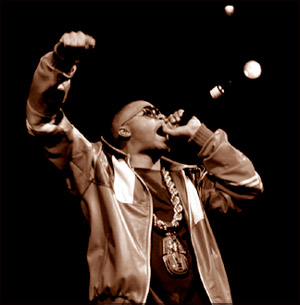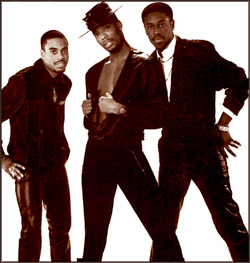Is the world ready for hip-hop orchestras?
How did we ever survive without them?
by Eric K. Arnold
Let's hear it for the band. No, really:
How about a nice round of applause for actual musicians who still play
actual music, together, live? For a while there, folks worried that the
band would go the way of the dinosaur or
 the
Pet Rock, doomed to oblivion by the advent of technology that made it
possible for one guy pressing buttons to replace an entire orchestra,
and the popularity of DJs, who, as tastemakers at the time breathlessly
insisted, were supposed to morph into the rock stars of our generation. the
Pet Rock, doomed to oblivion by the advent of technology that made it
possible for one guy pressing buttons to replace an entire orchestra,
and the popularity of DJs, who, as tastemakers at the time breathlessly
insisted, were supposed to morph into the rock stars of our generation.
Yet even at the height of electronica's sway in the late '90s and
early '00s, live bands with electronic and hip-hop elements remained on
the periphery of the national scene, with occasional mainstream
breakthroughs like the Roots. And in some quarters -- namely Los
Angeles, Philadelphia, New York, and, yes, the Bay Area -- they've
remained as much a part of the musical and cultural landscape as any
producer, MC, or singer you'd care to name.
So now, let's make it official: The band is officially back. Not only
that, but now bands are getting literally bigger, with some collectives
reaching well into double-digits.
The simple reason for this, explains Destani Wolf, singer for local
ten-piece outfit O-Maya, is that "The world is getting smaller," not so
much geographically as musically. O-Maya's influences, for one, are
literally all over the map.
"We have a mixture of people from Puerto Rico, Nicaragua ... we've
grown up listening to soul music, conscious hip-hop, ranchero music from
Mexico," she explains. "Personally for us, because of the kind of music
we're doing, it was important to include congas and timbales, and have a
piano player that also plays accordion."
Once known mostly for rock, the bay's own live music scene has taken
on a distinctly ethnic tint in recent years. Over the last two decades,
this phenomenon has evolved in three stages: the '80s "world beat" era,
when bands such as the Freaky Executives, Zulu Spear, and the Looters
ruled the roost; the '90s "acid jazz" era, defined by Afro-futurist
amalgamators such as Alphabet Soup, Broun Fellinis, and Mingus Amungus;
and the current era (let's call it "urban world") led by multiculti
fusionistas such as Bat Makumba, Aphrodesia, and O-Maya, whose
self-titled 2003 debut album updated traditional Latin, African, Cuban,
Chicano, and Boriqua rhythms with masterful modern touches.
Wolf doesn't believe the return of the band is necessarily a backlash
against electronic music, noting that many current local acts have
incorporated turntablists, rappers, and MPC beats along with live
instrumentation. Take, for example, 75 Degrees (which has earned
comparisons to Sly and the Family Stone) and the Crown City Rockers,
whose upcoming CD will feature a guest spot from Wolf herself.
"We're constantly evolving," Wolf says of the Bay Area. But though
our unique environment has played a part in this evolution, the Bay Area
is not alone in embracing musical diversity, either. Out on tour, "I
definitely see other bands out there," she notes. "From Texas, Miami,
Los Angeles -- places where you have this array of backgrounds and
cultures."
Want more proof? Try two of 2004's best albums thus far: Ozomatli's
Street Signs and Antibalas' Who Is This America. Both are slamming,
polyrhythmic affairs that eschew the narrow-minded superficiality of the
majority of pop music these days. And while both rely on various
cultural touchstones, each remains rooted to a stylistic base: In
Ozomatli's case, it's Latin music; for Antibalas, it's Afrobeat.
Antibalas lead singer Abraham Amayo explains that the fifteen-piece,
Brooklyn-based collective isn't interested in taking a "fast-food" approach to music: "Music is for listening and
thinking," he says, quoting Afrobeat founder Fela Kuti. Although
Antibalas' music is groovy as can be, partying and dancing are secondary
concerns -- "Afrobeat needs to be very long," he explains. "When you
send impulses, it takes a minute to really circulate."
taking a "fast-food" approach to music: "Music is for listening and
thinking," he says, quoting Afrobeat founder Fela Kuti. Although
Antibalas' music is groovy as can be, partying and dancing are secondary
concerns -- "Afrobeat needs to be very long," he explains. "When you
send impulses, it takes a minute to really circulate."
And in a genre like Afrobeat, where the message is an integral part
of the medium, sometimes it takes fifteen- or twenty-minute songs to
relay that message. Rather than a quick bite, Amayo says, "it's like a
full-course meal."
If O-Maya is a tasty entr‚e and Antibalas offers up a complete
dinner, then Dakah is an all-you-can-eat smorgasbord. The newest
cultural export from the City of Angels, this sixty-member outfit lives
up to its billing as a "hip-hop orchestra" with full string and horn
sections in addition to several MCs and two DJs.
The result follows in the footsteps of El Lay groups such as Ozo and
Breakestra -- who helped establish the funky precedent for the
postmodern big band -- but ups the ante by blending hip-hop and jazz
with classical. Dakah's first album, recorded live last July in Los
Angeles, is nothing if not ambitious: "Reepus II in A Minor," which
occupies the album's entire second disc, contains two movements and no
less than fifteen individual segments.
However, cheeky titles like "Chillintando" and "Reep What You Flow"
make it plain that these aren't your parents' symphonic arrangements.
Not by a long shot. "The symphonic culture and the hip-hop culture are
each their own animal," explains Dakah bandleader Dakonduktah (known
alternately as Double G and Stravingus). "You gotta do it with an open
mind, and respect for both the cultures individually."
The moniker Stravingus, he adds, comes from two of his biggest
influences: Igor Stravinsky and Charles Mingus. "Both of those
independently are pretty different from each other," he admits, "but
Stravinsky's music has a hell of a groove, man.
And so does Mingus." Double G's other influences -- the Roots, Gang
Starr, and Wu-Tang Clan -- also reveal a deep appreciation for hip-hop
composers like Premier and RZA. Stravingus speculates the next few years
could yield a "renaissance" of large bands and new composers, bringing
innovative ideas to music culture. "It could be that we dissolve a lot
of barriers among people," he says.
"This is a powerful time," O-Maya's Wolf concludes. "There's a lot
that needs to be said. People are gravitating toward music -- music is a
place of power. You really have a voice." The more voices you can
collect in one band, the better. |
